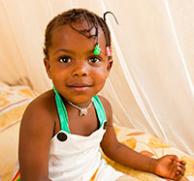NetWorks Makes the Case for SBCC in Malaria Control; Launches New SBCC Course
The NetWorks project has published a commentary in this month’s Malaria Journal that argues for continued use of social and behavior change communication (SBCC) in malaria treatment and prevention programming. While much progress has been made against malaria in the last decade, lead author Hannah Koenker says SBCC can be used to reach populations who remain at risk as transmission dynamics change. It can also be used to identify people with asymptomatic infections and monitor their compliance with treatment, as well as informing communities of optimal times for malaria control interventions.
Another article from the NetWorks team, appearing in the Dec. 27 issue of PLOS ONE, notes the progress made in the fight against malaria, but calls for “substantial additional resources” to maintain universal coverage of long-lasting insecticidal nets (LLINs). “Unless these resources are mobilized, the impressive gains made to date will not be sustained and tens of thousands of avoidable child deaths will occur.”
NetWorks is a USAID-funded project designed to prevent malaria by increasing access to long-lasting insecticidal nets (LLINs) and promoting consistent use of LLINs to prevent malaria. NetWorks is led by Johns Hopkins Bloomberg School of Public Health’s Center for Communication Programs (JHU·CCP) in partnership with the Malaria Consortium, Catholic Relief Services, Mennonite Economic Development Association (MEDA), consultants from the London School of Hygiene and Tropical Medicine (LSHTM) and International Procurement Agency (IPA), and a wide range of in-country collaborating partners.
NetWorks also just launched a new online training series on evidence-based SBCC. This series is designed primarily for those who work on malaria control and prevention programs. Both fundamental and advanced SBCC concepts are presented, along with examples from recent malaria programs. If you want to strengthen your capacity and gain knowledge on using evidence and data to create strong SBCC programs for malaria, then this series is for you.









Leave a Reply
Want to join the discussion?Feel free to contribute!